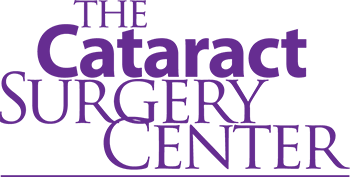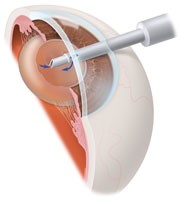Cataract Surgery
New England Vision  is the Cataract Surgery Center for Vermont, northern New York, and western New Hampshire. If you have been told that you have cataracts, entrust your vision to one of our excellent surgeon: Dr. Juli Larson.
is the Cataract Surgery Center for Vermont, northern New York, and western New Hampshire. If you have been told that you have cataracts, entrust your vision to one of our excellent surgeon: Dr. Juli Larson.
Before surgery, it is important to understand what exactly cataracts are, the potential risks of surgery, and all of your options. Spend some time thinking about your preferred focal point after surgery, and consider the type of intraocular lens implant that best meets your expectations. After all, the lens implant that you select has a tremendous impact on your vision, and New England Vision offers more intraocular lens options than any other practice in the area. Especially if you live an active lifestyle, be sure to choose the lens that is right for you!
About Cataract Surgery
 Cataract surgery replaces the cloudy lens inside of your eye with a clear artificial lens implant.
Cataract surgery replaces the cloudy lens inside of your eye with a clear artificial lens implant.
The purpose of cataract surgery is to improve your vision and your ability to do the things that you enjoy. If your cataract symptoms are not bothering you very much, or if a new pair of glasses is able to help you see adequately, surgery may not be necessary. Surgery should be considered only when your vision is keeping you from doing the things that you want or need to do.
Before proceeding with cataract surgery, you should understand the risks of this procedure. These include (but are not limited to) bleeding, infection, inflammation, increased eye pressure, swelling of the cornea, droopy eyelid, retinal detachment, need for additional surgery or laser procedures, need for glasses, loss of vision, loss of the eye, and problems with anesthesia. Altogether, the risk of having a problem with cataract surgery is approximately 1%.
When you meet with your ophthalmologist to discuss cataract surgery, you should bring a list of all the medicines you take. Discuss with him your history of any eye problems (including previous eye surgeries, laser vision correction, glaucoma, or a lazy eye as a child). Also, be sure to report any problems that you have with lying flat on your back or with claustrophobia (being in small spaces).
If you and your ophthalmologist decide that cataract surgery is the best treatment for you, measurements of the eye will be taken and the procedure will be scheduled. At New England Vision, surgery is done on the first floor in The Eye Surgery Center.
When you arrive for surgery, you will be given drops to dilate your pupil. An I.V. will be placed in your arm, and you will receive relaxing medicine to help you feel calm during the surgery. For safety reasons, patients undergoing cataract surgery do not go completely to sleep. However, almost all patients report feeling no pain and feeling very comfortable during the operation. Just before going to the operating room, the eye is numbed.
In the operating room, the surgeon makes a small cut (incision) into your eye. He goes inside of the eye, uses a special instrument to break apart the cataract into small pieces, and then removes these small pieces. After this is done, the ophthalmologist inserts a clear lens implant into the eye. In most cases, because the incision is so small, no stitches are needed. The entire surgery usually takes about 10-20 minutes to complete. You may see light and movement during the procedure, but you will not see what your surgeon is doing to your eye.

When surgery is finished, you will have a bandage on your eye. You will spend about 1 hour in the recovery room, and then you will get to go home. Be sure you have someone to drive you home after surgery, as well as someone to drive you back to the office the following day for your post-operative appointment.
Most patients notice an improvement in their vision within 1 to 3 days. It takes several months for your eye to completely heal, but most people are able to return to their normal routine (including work) after several days. Your ophthalmologist will give you some activity restrictions which will last 1-2 weeks. You will also use several eye drops after surgery to reduce the chances of infection and aid the healing process.
Follow-up care is a key part of your treatment and safety. Be sure to go to all scheduled appointments, and call your doctor if you are having problems.
After your eye has fully recovered, you may still need to wear glasses, especially for reading. Your dependence on glasses largely depends on the focal point you select and your choice of a lens implant.
Please explore the pages on our website to learn more about these topics and to expand your understanding about all aspects of cataract surgery. If you have any questions, do not hesitate to contact us.



